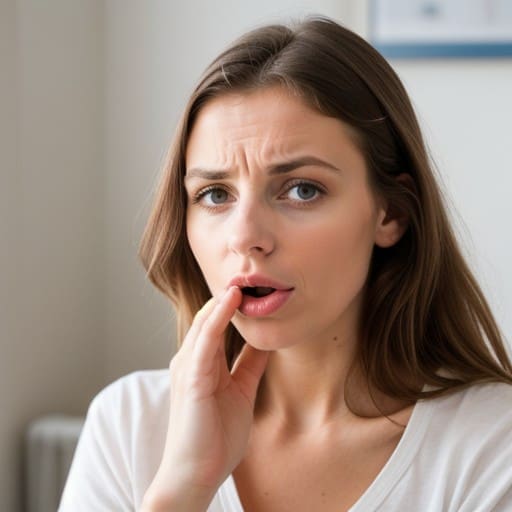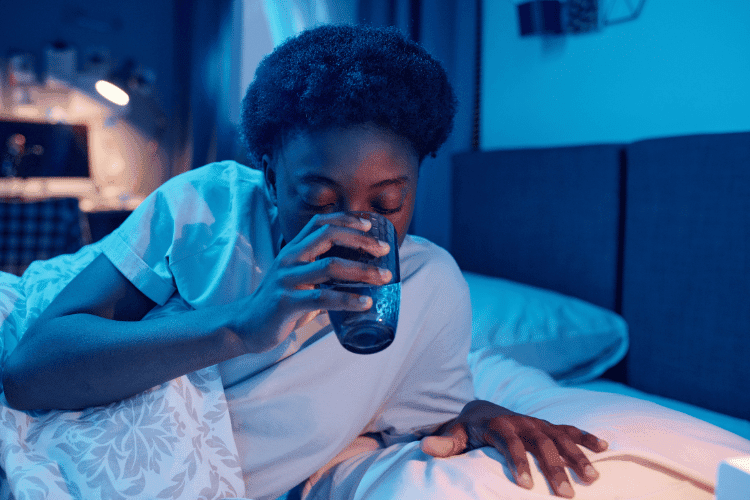There’s nothing better than a good night’s sleep to start a great day–you wake refreshed and you’re ready for whatever comes your way! But if you woke up today with a dry mouth and a scratchy, sore throat you might be one of the more than 20 percent of the world’s population who share that complaint. If it happens a lot, however, it might be a sign of something more important.

The medical terms for dry mouth and sore throat are xerostomia (zeer-o-STOE-me-uh) and pharyngitis (feh·ruhn·JAI·tuhs). Painful swallowing, uncomfortable eating, and daytime sleepiness tell you it simply wasn’t the great night’s sleep you wanted.
The causes of these symptoms might be important to look into, some even life-saving to understand. Read more to learn about the symptoms of these problems and what you can do to alleviate them.
Everybody snores once in a while, though it’s usually a gentle snore. But sometimes it can get loud, harsh, and prolonged if the muscles in your throat relax more than usual during sleep. In that case,
Chronic snoring can be a sign of obstructive
About 15 to 30 percent of males and half as many females are thought to have OSA–more than five obstructive events per hour of sleep [an “apnea-hypopnea” index (AHI) of 5 or more].
Untreated OSA, then, is a major cause of waking up with a dry mouth and sore throat. And beyond an annoyance, it can also be a warning sign worth heeding.
Dry mouth has two main causes. Either your salivary glands produce enough saliva but it is drying out too fast, or you might simply not make enough saliva.
OSA can cause a dry mouth and a sore throat, but they also point to the more dangerous possible results OSA. Apneic episodes cause near-suffocation during sleep, a condition with serious, potentially even life-threatening, consequences for the heart, lung, neurological, and other body systems. This sleep disorder can also aggravate diabetes, disturb your metabolism, and even create mood and personality disorders.
Treating
In the absence of OSA, there are many other reasons for waking up with a dry mouth and a sore throat. Though your saliva production can be normal, it can be dried up faster than you can make it.
Alcohol and excessive drinking can be incredibly dehydrating, so if you drink alcohol consistently or to excess, you will find that you are more than likely to wake up with a very dry mouth.
Nasal passages clogged by mucus, closed by inflammation from allergy, a cold-induced, or excessively dry indoor air, can dry your mouth overnight. An unconscious reflex simply opens your mouth while you sleep. You sense the increased work of breathing and select your mouth as “breathing-plan-B.” It’s the path of least resistance. The price of success, however, is a dry mouth and a sore throat in the morning.
Antihistamines and mucus softening over-the-counter medications may be your best choice to prevent this kind of morning dryness.
Nasal strips flare your nostrils outward while you sleep, easing airflow through your nose, now the path of least resistance. The swirled turbinate bones of the nose also make it an extremely efficient humidifier. Nasal strips can be an effective defense against dry-mouth mornings.
If you use mouth-ware during sleep, such as bite-splints or dental retainers, they may not let you fully close your mouth. As a result, some mouth breathing is likely to dry your mouth.
Acid reflux, gastroesophageal reflux disease, or GERD, is a digestive disorder aggravated by lying down at night. Stomach acid flows back up your esophagus and into your throat. As a result, your throat can feel sore and scratchy when you wake up. A burning sensation in your throat each morning would be a sign you may be suffering from GERD. The good news is, once properly diagnosed, there are over-the-counter solutions for this such as Nexium or Prilosec.

Most of us think that all we need to do is use a humidifier to solve this problem. While humidifiers can be beneficial, especially during the dryer winter months when the heater is running, there can be other factors that are causing your chronic dry mouth issues.
Rather than the air drying your mouth, your salivary glands might not be making enough saliva overnight.
If you’re a coffee lover, you should know that caffeine, whether from coffee, tea, or other caffeinated beverages, decreases saliva production at night if consumed too late. Overnight moisturizing lozenges or early morning moisturizing sprays can help.
Nicotine products, whether smoked, chewed, or vaped, are also known to decrease saliva flow, cause oral dehydration, and lead to an unpleasant “cottonmouth” feel. Though nobody smokes in their sleep, lingering blood nicotine levels can be high enough to create dry mouth by morning.
And sometimes, you just need to create better habits in order to improve your overall sleep hygiene and sleep quality night in and night out.
If you’ve noticed a persistent pattern of waking up with a dry mouth and sore throat every morning, over many days or weeks, it may be time to make an appointment with your doctor.
If your doctor suspects those are symptoms of
Heart, lung, and brain activity during sleep may also be measured. Many of these studies can be done at home while others are hospital-based.
If your doctor detects severe
After all, there’s nothing better than a good night’s sleep to start a great day–you’ll wake refreshed and ready for whatever comes your way!